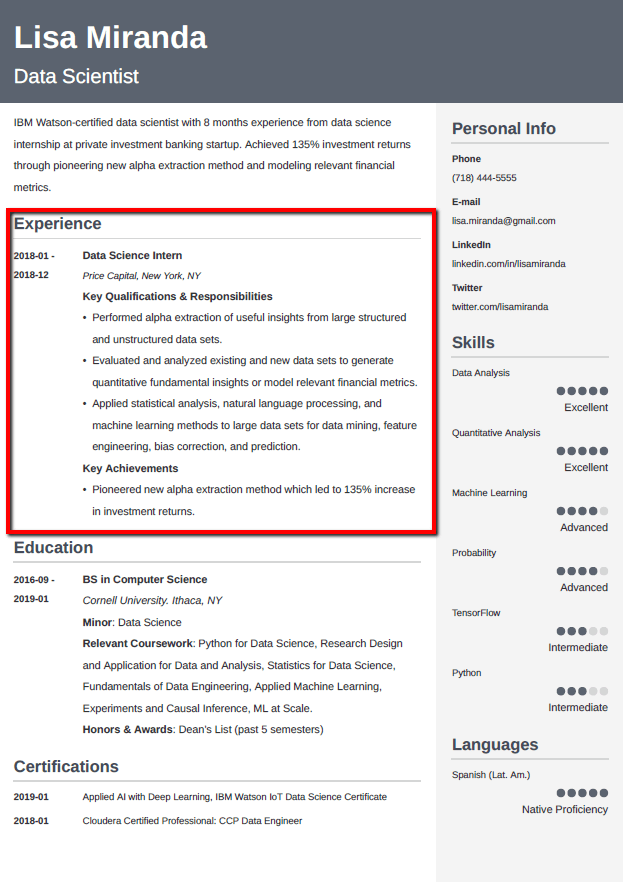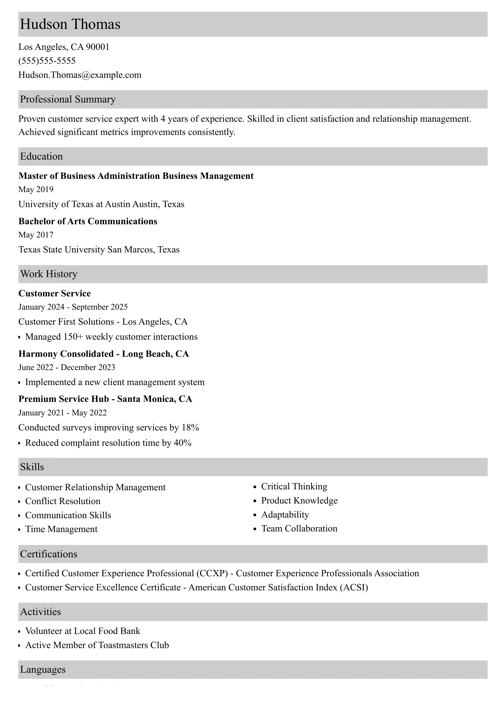Adding an internship to your resume makes sense. Especially if your professional experience is limited.
But—
How to put it on your resume? Does it need a separate section? And is it really necessary to always list it?
You’re about to find out.
This guide will show you:
- When including an internship on a resume is worth it—and when it is not.
- Where and how to add your internship experience on a resume.
- Pro tips and examples of resumes with an internship to help you create yours.
Want to save time and have your resume ready in 5 minutes? Try our resume builder. It’s fast and easy to use. Plus, you’ll get ready-made content to add with one click. Explore our free resume templates and start building your resume today.
Sample resume made with our builder—See more resume examples here.
Want to write a resume for internships? Switch over to our dedicated guide: How to Write a Resume for an Internship & Get It
Looking for more resume writing advice? We’ve got you covered:
- How to Make a Resume for a Job
- How to Put Your Education on a Resume
- Student Resume Sample & Writing Guide
- Resume Format: Samples and Templates
- Resume Styles: How to Pick the Best One
- Resume Sections & Item Order
- How to List a Degree on a Resume
- How to List a Minor & Major on a Resume
- How to Put Your Expected Graduation Date on a Resume
- How to Put Athletics on a Resume
- How to Put Phi Beta Kappa on a Resume
- Relevant Coursework on a Resume
- How to Put Study Abroad on a Resume
- More Sample Resumes for 500+ Jobs
1. Why Internship on a Resume Can Be a Great Thing & When to Add It
Here’s the thing—
Internship experience on a resume can seriously kickstart your career.
How’s that?
Let’s take a look at some stats—
What is the most influential factor when employers select one entry-level candidate over another?
Answer: Internship with the employer’s organization.
And one more:
What’s the second most influential factor in making a hiring decision?
Answer: Internship experience in a given industry.
And no. I'm not making this up.
These are the results of the 2019 NACE Job Outlook survey.
In fact—
These two rank #1 and #2 on the list of the most influential attributes when deciding between hiring equally skilled candidates, with the scores of 4.6 and 4.5 respectively on a 5-point scale.
More than this—
The same two factors topped the list in NACE’s previous survey as well.
See the point?
If you’re about to enter the job market, internship on a resume is no longer a nice-to-have.
It’s more of a must-have.
Pro Tip: If you have no internship experience to show off on your resume, fret not. Volunteering on a resume could be just as valuable.
Plus—
It’s not any kind of internship experience on a resume that matters.
It’s either an internship within the employer’s own organization or industry.
In other words:
Relevant internship experience.
And one more thing—
You don’t need to list an internship on your resume if you’ve had paid job experience in the meantime.
An executive who listed their internship and GPA on a resume wouldn't be taken seriously, would they?
Listing an internship on a resume makes sense on your first resume without work experience, or if you’ve been in the workforce for less than 2 years.
Pro Tip: If you interned with the likes of Google or Apple, you may consider including this on your resume for up to five years after completion. But that’s the absolute maximum.
Just graduated from college? No idea how to go about writing a job-winning resume? Head straight to our guide: Recent College Graduate Resume: Sample & Full Guide [20+ Examples]
Making a resume with our builder is incredibly simple. Follow our step-by-step guide, use ready-made content tailored to your job and have a resume ready in minutes.
When you’re done, our professional resume builder will score your resume and our ATS resume checker will tell you exactly how to make it better.
2. How to List an Internship on a Resume
Do you know why employers pay so much attention to an internship on your resume?
Because it’s the very beginning of your professional experience.
And the latest Recruiter Nation Report from Jobvite proves that—
Experience is what employers desire most in candidates.
So treat your time as an intern as your professional experience, and put it in your resume experience section.
It could look like this:
Internship on a Resume—Sample

Pro Tip: Don’t have any internship experience to show off on your resume? Don’t worry. Start with learning how to find an internship that’s right for you and successfully apply for it.
Remember—
It doesn’t matter if you were paid or not.
You can put unpaid internship (volunteering) on a resume in the experience section too. As long as it’s related to the job ad.
It’s the experience that matters, not the money.
Now:
Here’s how to format your internship experience on a resume for maximum impact:
- Add the job title but don’t refer to yourself as an intern. Specify what kind of internship you did. For example, Data Science Intern or UX Intern. This way the employer will immediately know what kind of skills can be expected of you.
- List the company name, and specify the dates of your internship.
- Add your duties in bullet points. Up to 5 bullets will do.
- Highlight the experience you gained that’s relevant to the position you’re seeking. In other words, always tailor your resume to the job description.
- Write short sentences and start them with resume action words, for example, collaborated, evaluated, applied, delivered, etc.
- Last but not least, focus on your achievements and quantify whatever you can. Numbers prove your real-life impact.
Here’s what this looks like in practice.
Internship on a Resume—Example
July 2018–September 2018
Garage UX Designer (Summer Internship)
Microsoft, Cambridge, MA
- Collaborated in a cross-functional team of 5 interns (incl. software engineers and program manager) on an online resume builder.
- Defined the design and UX to delight the user and deliver functionality in an elegant and efficient manner.
Key achievement:
- Delivered the MVP version of the resume builder after 14 weeks of collaboration.
Pro Tip: Don’t put a future internship on your resume. Your resume is about the past experience that you actually had. No one knows what the future holds.
Not sure what else you could include in your resume? Read out guide on What to Put on a Resume (20+ Good Things You Should Include to Win).
Plus, a great cover letter that matches your resume will give you an advantage over other candidates. You can write it in our cover letter builder here. Here's what it may look like:
See more cover letter templates and start writing.
Key Takeaways
Here’s how to put an internship on a resume:
- Make sure your internship is relevant to the position you’re after.
- List your internship in the professional experience section of your resume.
- Specify what kind of internship you had in the job title.
- List the company name, dates, and location.
- Describe your internship experience using bullet points.
- Add info on your key achievement(s).
About Zety’s Editorial Process
This article has been reviewed by our editorial team to make sure it follows Zety's editorial guidelines. We’re committed to sharing our expertise and giving you trustworthy career advice tailored to your needs. High-quality content is what brings over 40 million readers to our site every year. But we don't stop there. Our team conducts original research to understand the job market better, and we pride ourselves on being quoted by top universities and prime media outlets from around the world.


![How to Put an Internship on a Resume [Guide and Examples]](https://cdn-images.zety.com/pages/internship-on-resume-ztus-cta-02.webp)


